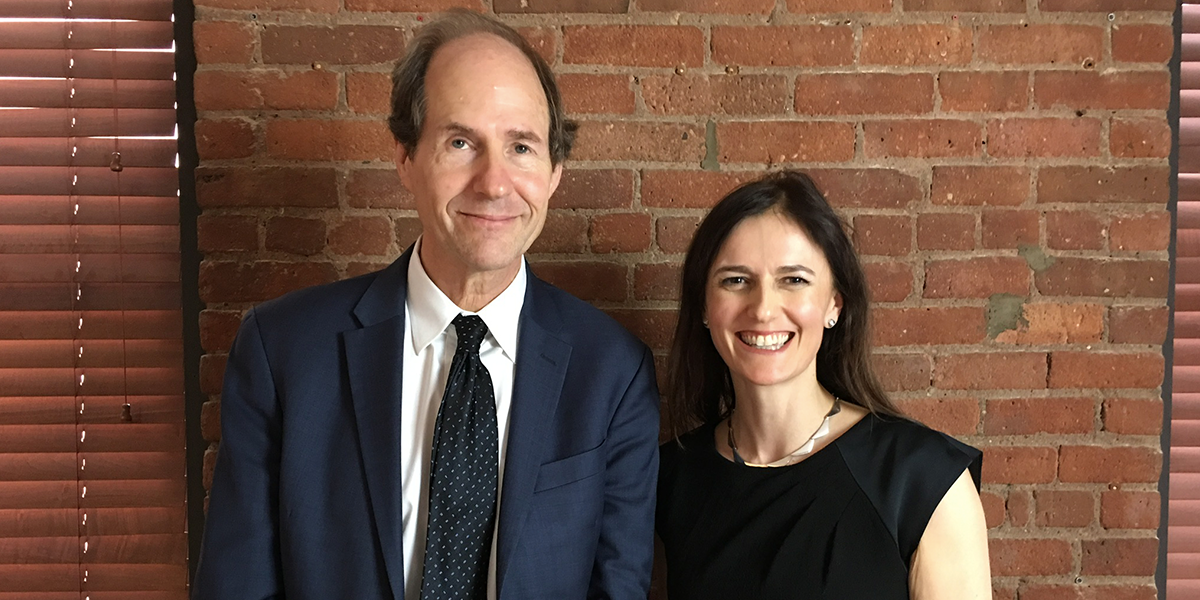Cass Sunstein is an American legal scholar, former Administrator to the White House Office of Information and Regulatory Affairs in the Obama Administration, and current professor at Harvard Law School. He is the author of many books of legal scholarship, behavioral economics, and political theory, and is well known for his 2008 work Nudge: Improving Decisions about Health, Wealth, and Happiness. He recently joined Caroline Webb, CEO of Sevenshift and author of How to Have a Good Day, in a conversation about the way that governments and businesses are beginning to embrace behavioral science, and what it is they’re trying to achieve.
Caroline: How did you get involved in thinking about behavioral science?
Cass: I was at the University of Chicago as a law professor, and the orthodoxy was that people are rational and they respond to incentives. The people who were proclaiming this were exceptionally intelligent, but they were also, on the tennis court, erratic and hitting balls that they had no business hitting because that was not the rational shot to hit. Or they were complaining about their investments, where they had blundered, or they were having divorces and saying they’d made some terrible mistakes in their life. So they didn’t seem completely rational.
I was an English major, so knowing about Dickens and Shakespeare you would be a little bit cautious about the idea that people are rational actors, but Shakespeare and Dickens didn’t exactly give you a framework. I discovered some work in psychology and behavioral economics five or seven years into teaching law, and it struck me like a thunderbolt. As soon as I saw that there was systematizing of how people go wrong, I thought, “There’s not only psychology and economics in here, there’s stuff for law and public policy to get hold of.” It’s oriented much of my work since then.
Caroline: The subtitle of your book, Nudge, is “Improving Decisions about Health, Wealth, and Happiness.” Is that still the goal of applied behavioral science?
Cass: Yes, those are at the top of any list. If you think about people going about their daily lives or businesses, doctors trying to be good with their patients, or governments trying to make sure that the health system is working, or that economic growth is accelerating, it’s a good trilogy. Though you might want to put happiness first.
Caroline: Why is that?
Cass: Health is extremely important, and longevity is desirable, but if someone has a health condition, the effect of that condition on their well-being depends on where their mind is going. You can have a terrific life even if you have to use a wheelchair. So much of one’s reaction to health conditions or to wealth is a reflection of how attention works. If you have economic deprivation, you’re going to struggle with a lot of stuff, but the extent of your struggle depends on your mind, and there the spotlight is rightly put on happiness or well-being.
Caroline: I tend to use the word well-being more than happiness, because happiness is one of those things that when you try to aim directly at it, you start to think, “What am I defining as happiness here?”
“For a government to be thinking that well-being is a large part of what it’s focusing on, that’s a pretty good idea.”
Cass: You’re completely right. There’s some terrific work in social science on states that are essentially byproducts—if you try to aim at sleep, probably you’re going to stay up a lot. If you try to aim at happiness, probably you’re not going to be so happy. Being grateful can make you feel happy, but if you’re being grateful in order to feel happy it’s probably not going to work. It has to be genuine gratitude. Well-being is a better term. Also, happiness connotes, in English at least, something superficial, and well-being can be a sense of inner peace or calm.
Caroline: It’s a wider term, in a way. It embraces more personalities.
Cass: Absolutely. For government to be thinking that happiness is its project maybe isn’t quite right. But for a government to be thinking that well-being is a large part of what it’s focusing on, that’s a pretty good idea.
Caroline: What are the things that governments have been doing in the last few years that you’re most excited about?
Cass: In the United States, there have been numerous things designed to help people get the ingredients of well-being. One, for children, might be healthy food. We’ve had policies where, if the locality knows that the kid is eligible for the food, the person is automatically in. The parents don’t have to sign him up. It’s a really small thing, switching the default, but it has contributed to a situation in which twelve million children are getting food.
With credit cards, there’s been an effort to help consumers manage their finances better. The companies have to tell people about what’s going to happen if they pay their bills late or don’t pay them, and that disclosure on credit card bills has been a part of a set of reforms from 2009 which are giving consumers twelve billion dollars more annually.
Caroline: They’re tiny tweaks, and yet they can have huge effects in people’s lives.
Cass: Exactly.
“When it comes to public policy and using behavioral science, it’s all about making it easier for the automatic systems in people’s brains to comprehend what the right choices are.”
Caroline: When it comes to public policy and using behavioral science, it’s all about making it easier for the automatic systems in people’s brains to comprehend what the right choices are. The toolkit that we reach for is simplifying and clarifying messages, making them very personal, perhaps social, because that’s something we’re automatically drawn to. Is there anything that we miss?
Cass: There are two pieces of the toolkit which we’re going to see a lot more of in the next ten years. One is reminders. If the question is how to get people to make a doctor’s appointment, or to get employees to engage in some activity, a little text reminder can make a huge difference. It’s interesting as well as practical. Attention is the foundation of the behavioral.
The other that we haven’t focused on enough is active choosing. Just to say to people “Are you going to vote in the next election?” increases voting. To ask a large audience, “How many of you are going to buy an automobile in the next year?” increases purchases.
Caroline: There’s a set of behavioral science about how the brain responds to threats and rewards, and one of the most profoundly rewarding things for the human being is autonomy. It’s quite exciting and powerful to allow people the sense that they’re making the choice for themselves.
Cass: Yes. There’s a fantastic study where people are told if you go into a smoking program and succeed in quitting you will get a bonus at the end of the year. People really like that program. They go in in very large numbers.
There’s another where people are told there’s a smoking program where if you go in you will lose money at the end of the year if you don’t cease smoking. They don’t go in that that much because they perceive it as a threat rather than an opportunity to earn something.
Caroline: Another study on smoking cessation looked at whether the doctor’s behavior was autonomy supportive. Are you giving the patient choices? They found that people had much higher chance of stopping smoking if they were working with a doctor who gave them a sense of control in the process.
Cass: The two system brain has a really interesting relationship to what we’re talking about, because there are reforms that can be undertaken by companies or doctors or governments that let the automatic system just go about its business, like the default rule. For active choosing, often we’re giving a little signal to system two, like a reminder, and giving system two its moment.
Caroline: System two being the deliberate, reflective system.
Cass: Exactly. If people feel deliberatively identified with this course of action, then they can get on a path that’s something they are long-term committed to.
Caroline: You did some work recently on green energy choices. Interestingly, when a default was to choose a green energy option, it could provoke almost a sense of resentment. But if people had a sense that they were making a choice in line with their values, it was more likely to be something they’d go for.
Cass: This is a result that I was really surprised by, because the general view is that if you enroll people automatically in something you’ll get a big uptick in their participation rates. If you ask them whether they want to choose, then you’ll get an uptick not as big as automatic enrollment, and if you ask them if they want to participate where the default is not, then that’s the loser of the three. But for green energy, the hierarchy is flipped. If people are automatically enrolled in green energy, a non-trivial number will say, “You’re doing that to me?”
The default is effective, but not as effective as I anticipated. If people are asked, “Do you want to be in green energy?” under circumstances where they’re making an active choice, they don’t feel upset and their moral convictions kick in. Not everyone, but enough so that’s an effective environmental strategy.
Caroline: That takes us much closer to the environments that I work in, workplaces, where typically as a boss you can’t just tell people what to do. You hit up against the limits of that pretty quickly, because people are not as motivated if they don’t have that sense of autonomy. That’s why I often find myself teaching people how to be coaches, because a good coach doesn’t tell you what to do. A good coach asks the right questions to elicit your own thinking.
Cass: That’s great. The best coach in the history of sports is a boxing trainer named Angelo Dundee, who trained Muhammad Ali, the greatest and most egotistical boxer in history. Angelo Dundee was asked, “How did you tell him what to do?” He said, “If Ali wasn’t throwing a left hook in practice and he needed to, I’d say to him, ‘Muhammad, your left hook is tremendous today. I love how you’re throwing the left hook. Just keep doing what you’re doing.'” Then he’d start throwing the left hook.
Caroline: Then he owns the choice and he’s very happy with it. Actually, we often forget to give feedback on the things that are fantastic that people should do more of. Sometimes they’re really small, but start by saying you’re really great at that, and you’re engaging with people’s brains in a very different way. You’re creating a rewarding environment for them.
Cass: If you start out with something positive, it does a bunch of things at once. First, it gives them something to focus on rather than be demoralized. Second, it makes them more receptive to critical stuff. Third, it establishes a relationship of constructive improvement, rather than being acted on by this person who knows better.
Caroline: In the business environment, it’s not just about how do you nudge a customer into choosing this product over that product. There’s a lot of science on how to help people be at their best—how you create a more rewarding environment that helps people’s brains not be on the defensive. I don’t see that side of behavioral science in public policy yet.
“In the past, we’ve tended to focus on loss aversion, that if you tell someone that they’re going to suffer, that’s very motivating to get people to act. But there is a category of decisions where painting a positive picture is quite helpful.”
Cass: In the United States, there’s an effort to encourage people in the military to enroll in savings programs, which involve active choosing. That produced a significant uptick. So there are some strategies. But it’s hard—it’d be a little hokey for the government to give them some general compliment.
Caroline: [laughs] You’re amazing, please vote.
But there is something interesting about the power of positive framing of messages. In the past, we’ve tended to focus on loss aversion, that if you tell someone that they’re going to suffer, that’s very motivating to get people to act. But there is a category of decisions where painting a positive picture is quite helpful.
Cass: You’re right, we need more thinking and research on this. The standard view is if you tell people you’re going to lose X if you don’t do something, then they get activated. But not only is it dispiriting to focus on that, it can be unsuccessful, because people might think, “To heck with you.”
Caroline: Yes, and they might step away from the whole arena because it makes them feel bad.
Cass: There’s data suggesting that loss aversion, though it focuses the mind, can also quickly produce a counter-reaction of, “I don’t believe you.” There’s recent work which is consistent with what you say, where a gain frame can be more effective because it doesn’t produce the counter-reaction. It’s also, hedonically, better to hear you can gain this.
Caroline: You were one of the first people to publicize the gain versus loss framing. I remember, in Nudge, you talked about the finding that when you frame surgery as “90 percent of people survive,” people are more drawn to it than “10 percent die.”
Cass: Yes, even though the “90 percent live” frame is not more accurate than the “10 percent don’t.” Of course, the more neutral frame is to say, “90 percent survive. 10 percent don’t.”
Caroline: Do you take this advice in the way you run your own life and make your own choices?
Cass: I try. In sports, if my team or someone I care about doesn’t do well, I try to think of some way of putting it in a context that makes it a more positive experience. To do this in a way that gets at the automatic system of the brain is challenging.
Another way that is more successful is to put your attention elsewhere. Daniel Kahneman, the great psychologist, I think the best sentence he ever wrote is: “Nothing in life is as important as you think it is when you’re thinking about it.” If it’s a setback in life or a challenge that you haven’t been able to meet, that’s a very good thing to think.
This conversation has been edited and condensed.





























